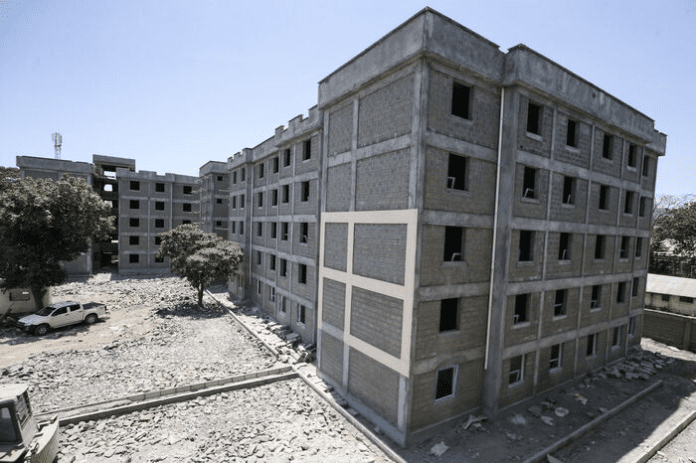
The government’s Affordable Housing Programme (AHP) has come under scrutiny after the Auditor General raised concerns over land ownership documentation for projects valued at Sh49.5 billion.
According to Auditor General Nancy Gathungu’s report for the financial year ending June 2024, the government failed to provide title deeds for land where the projects are being constructed. She warned that without these records, it is unclear whether proper land ownership structures exist, which could complicate the issuance of property titles to homeowners.
“The state department [of Housing] entered into contracts with various contractors for the construction of affordable houses across the country at a total contract sum of Sh49,456,549,086. However, land ownership documents for sites where the projects are being implemented were not provided for audit,” the report states.
Gathungu cautioned that the absence of these documents could hinder the sale of houses to the public since sectional titles cannot be issued without original land ownership records.
The latest findings add to ongoing concerns over the Affordable Housing Programme, which has faced inconsistencies in targets, transparency, and public confidence.
Despite previous warnings about land ownership issues, contracts for the projects were signed, raising concerns similar to the 2019 Jeevanjee Estate case, where Nairobi County land was transferred to a private developer and used as collateral for a Sh1.9 billion bank loan.

Despite these concerns, the government has maintained that the AHP remains on course. Lands and Housing Cabinet Secretary Alice Wahome stated that the first batch of 4,888 houses will be released in March, with a total of 140,000 units at various construction stages.
“I will be releasing 4,888 by the end of March and every quarter I will possibly be releasing between 4,000 and 5,000. In the next year, I should be having close to 140,000 houses,” Wahome said in February.
However, these figures differ from those presented in the 2025 Budget Policy Statement (BPS), which reports that 124,000 houses are under construction. Similarly, the government has provided conflicting data on job creation linked to the programme.
While Wahome stated that 1.12 million jobs had been created, Treasury reported over 164,000 jobs, and a previous State Department of Housing report in September 2024 cited 160,000 jobs for 100,000 housing units.
Public skepticism over the programme has been further fueled by the 1.5 per cent Housing Levy, deducted from salaries since July 2023. Initially introduced as a savings scheme, the levy was later restructured into a tax through the Finance Act, 2023. The government has since clarified that the funds are intended to support infrastructure development rather than directly financing home construction.
“This money is not supposed to give you a house, it’s the offtake. It’s money that is helping us build the house. After that, it’s you who pay for that house. We are not building and giving you, it’s like a tenant purchase,” Wahome explained.
Prospective homeowners will be required to make long-term payments of up to 30 years, with interest rates varying based on income levels. Low-income earners will access social housing at a three per cent interest rate, while those under AHP will pay five per cent. Individuals earning above Sh150,000 per month will purchase units at the market rate of nine per cent.
However, economists have criticized the financing model, arguing that it places a double financial burden on taxpayers by requiring both levy contributions and full payments for houses at market rates.
As of December 2024, the government had collected Sh88.7 billion from the Housing Levy, with Sh46 billion invested in Treasury bills instead of directly funding housing projects. Analysts have questioned whether the programme effectively addresses Kenya’s housing needs.
A report by the Kenya National Bureau of Statistics (KNBS) for 2023/24 revealed that 55.5 per cent of Kenyans prefer building their own homes over buying, while 62.3 per cent have no concrete homeownership plans. Of those aspiring to own homes, 62.6 per cent had not taken any steps towards achieving this goal, with only 11.2 per cent saving to construct houses and 10.7 per cent saving to buy land.
Additionally, affordability remains a key concern, as many target beneficiaries work in the informal sector with unstable incomes, making long-term mortgage repayments a challenge. A Central Bank survey found that 42 per cent of Kenyan companies had let go of casual workers, who form the primary target group for AHP homes. The government has confirmed that defaulters will face eviction.
Concerns have also been raised about whether AHP will truly benefit low-income earners or if politically connected individuals will take advantage of the scheme.
The 2025 Budget Policy Statement outlines plans to construct 363,860 houses over the next three years, including 217,654 affordable units, 80,909 social houses, and 65,297 institutional housing units.
However, with lingering questions over transparency, land ownership, affordability, and shifting government narratives, the future of the Affordable Housing Programme remains uncertain.






